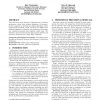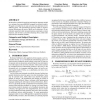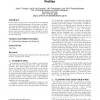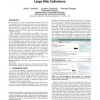SIGIR
2008
ACM
13 years 11 months ago
2008
ACM
This work presents the use of click graphs in improving query intent classifiers, which are critical if vertical search and general-purpose search services are to be offered in a ...
SIGIR
2008
ACM
13 years 11 months ago
2008
ACM
One of the central issues in learning to rank for information retrieval is to develop algorithms that construct ranking models by directly optimizing evaluation measures used in i...
SIGIR
2008
ACM
13 years 11 months ago
2008
ACM
This paper investigates the agreement of relevance assessments between official TREC judgments and those generated from an interactive IR experiment. Results show that 63% of docu...
SIGIR
2008
ACM
13 years 11 months ago
2008
ACM
There has been recent interest in collecting user or assessor preferences, rather than absolute judgments of relevance, for the evaluation or learning of ranking algorithms. Since...
SIGIR
2008
ACM
13 years 11 months ago
2008
ACM
We investigate a representative case of sudden information need change of Web users. By analyzing search engine query logs, we show that the majority of queries submitted by users...
SIGIR
2008
ACM
13 years 11 months ago
2008
ACM
We introduce a novel approach to expert finding based on multi-step relevance propagation from documents to related candidates. Relevance propagation is modeled with an absorbing ...
SIGIR
2008
ACM
13 years 11 months ago
2008
ACM
We describe a method for applying parsimonious language models to re-estimate the term probabilities assigned by relevance models. We apply our method to six topic sets from test ...
SIGIR
2008
ACM
13 years 11 months ago
2008
ACM
In this paper, we show how a user profile can be enhanced when a more detailed description of the products is included. Two main assumptions have been considered: the first implie...
SIGIR
2008
ACM
13 years 11 months ago
2008
ACM
Motivated by our work with political scientists who need to manually analyze large Web archives of news sites, we present SpotSigs, a new algorithm for extracting and matching sig...
SIGIR
2008
ACM
13 years 11 months ago
2008
ACM
We demonstrate that regularization can improve feedback in a language modeling framework. Categories and Subject Descriptors: H.3.3 Information Search and Retrieval: Relevance Fee...




